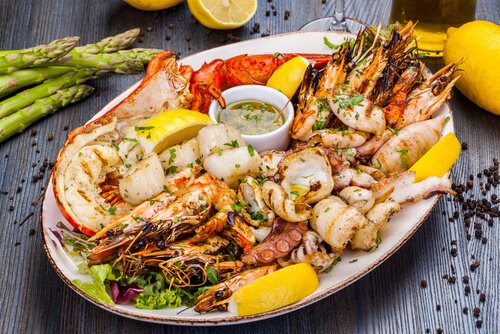Seven Reasons Why Seafood is Good for Your Brain

In the last few years, scientists have established that diet has a significant impact on how the brain works. In this regard, eating seafood benefits the brain in many ways.
Dieticians consider seafood a great addition to your diet because of how nutritious it is for brain health in the short and long-term. Seafood is also a perfect choice for people who are trying to lose weight because it’s very low in fat.
Recent studies on healthy diets support the claim that seafood is good for your health because it covers about 80% of the nutritional needs for all age groups. Most seafood also provides the same nutrients and protein as white fish.
Incorporating seafood into your diet will help you stay healthy. Thus, it doesn’t matter what kind of seafood you eat. Just pick your favorite!
Eating seafood boosts memory
Eating seafood regularly has a direct effect on concentration, memory, and intellectual activity because it contains a moderate level of manganese. This is one of those nutrients that your body can’t produce on its own. Thus, you have to get manganese from your diet so that your neurons can work to their full potential.
The vitamins, minerals, and fat in seafood are important for optimal brain development. A diet rich in seafood will improve your mental agility and memory.
Seafood improves your self-esteem
Seafood can even affect your self-esteem due to the amount of tryptophan it contains. Tryptophan is one of the eight essential amino acids. It’s the metabolic precursor to serotonin. This hormone transmits signals between nerve cells and directly affects your mood.
If you’re trying to lose weight, seafood can help. Like we mentioned before, it’s low in fat and high in protein, so you’ll feel fuller for longer.
Seafood improves neurological development
Researchers from the University of Amsterdam discovered that babies and small children whose mothers ate seafood during pregnancy showed better neurological development.
Seafood decreases intellectual fatigue
Seafood is rich in zinc, a mineral that helps the brain stay alert and may also decrease stress and anxiety.
Because seafood is moderately caloric, it’s easy to digest. However, studies show that it still gives you the necessary energy for all your daily activities. If you’re a physically and mentally active person, seafood is a great choice for you.
Improves your mood
Psychologists and neuropsychologists recommend consuming enough vitamin B12 to prevent depression. Eating fifty grams of seafood a week is enough to get all the B12 you need.
Seafood is high in antioxidants
Seafood contains selenium, one of the nutrients that the body needs to prevent oxidation. Oxygen is an essential element, as you certainly can’t live without it. However, if you don’t control your diet, you’re more likely to get sick and age faster. Antioxidants like selenium help slow down the reactions produced by oxidation.

Protects against Alzheimer’s
In a recent study published in the Journal of the American Medical Association (JAMA), researchers discovered that eating seafood as part of your regular diet reduces the risk of Alzheimer’s by 47%.
The researchers studied the 286 participants’ diet and eating habits. When the participants died, they analyzed their brains to try to discover a relationship between diet, memory, and aging. None of the participants had been diagnosed with Alzheimer’s when the study began, but those who frequently ate seafood were significantly less likely to develop a degenerative neurological condition.
Another reason why eating seafood is good for your brain is that it reduces your risk of Alzheimer’s.
In conclusion, eating a varied diet that contains fresh fruits and vegetables, carbohydrates, grains, bread, whole wheat pasta, brown rice, dairy, fish, and seafood will help you stay healthy in the short- and long-term.
This text is provided for informational purposes only and does not replace consultation with a professional. If in doubt, consult your specialist.








